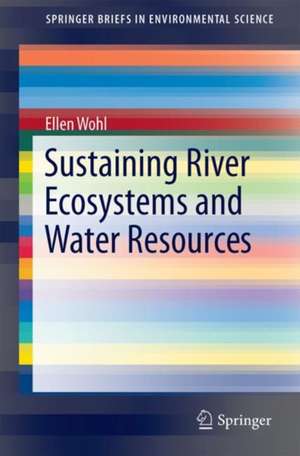Sustaining River Ecosystems and Water Resources: SpringerBriefs in Environmental Science
Autor Ellen Wohlen Limba Engleză Paperback – 8 sep 2017
This work is designed to broaden the scope with which many people regard a river. Rivers are commonly regarded from a very simplistic perspective as conduits for downstream flows of water. In this context, it may be considered acceptable and necessary to engineer the channel to either facilitate such flows (e.g., channelization, levees) or limit flows and store water (e.g., water supply reservoirs, flood control). The book presents the concept of a river as a spatially and temporally complex ecosystem that is likely to be disrupted in unexpected and damaging ways by direct river engineering and by human activities throughout a drainage basin.
Viewing a river as a complex ecosystem with nonlinear responses to human activities will help to promote a more nuanced and effective approach to managing river ecosystems and to sustaining the water resources that derive from rivers. In this context, water resources refers to ecosystem services including water supply, water quality, flood control, erosion control, and riverine biota (e.g., freshwater fisheries). Chapters in this book draw extensively on existing literature but integrate this literature from a fresh perspective. General principles are expanded upon and illustrated with photographs, line drawings, tables, and brief, site-specific case studies from rivers around the world.
Din seria SpringerBriefs in Environmental Science
-
 Preț: 348.77 lei
Preț: 348.77 lei -
 Preț: 382.57 lei
Preț: 382.57 lei -
 Preț: 378.12 lei
Preț: 378.12 lei -
 Preț: 378.80 lei
Preț: 378.80 lei -
 Preț: 381.98 lei
Preț: 381.98 lei -
 Preț: 347.80 lei
Preț: 347.80 lei - 15%
 Preț: 464.18 lei
Preț: 464.18 lei -
 Preț: 378.12 lei
Preț: 378.12 lei -
 Preț: 377.53 lei
Preț: 377.53 lei -
 Preț: 379.09 lei
Preț: 379.09 lei -
 Preț: 381.00 lei
Preț: 381.00 lei -
 Preț: 383.93 lei
Preț: 383.93 lei -
 Preț: 175.58 lei
Preț: 175.58 lei -
 Preț: 475.83 lei
Preț: 475.83 lei -
 Preț: 380.07 lei
Preț: 380.07 lei -
 Preț: 378.92 lei
Preț: 378.92 lei -
 Preț: 411.93 lei
Preț: 411.93 lei -
 Preț: 375.62 lei
Preț: 375.62 lei -
 Preț: 375.45 lei
Preț: 375.45 lei -
 Preț: 378.92 lei
Preț: 378.92 lei -
 Preț: 377.57 lei
Preț: 377.57 lei -
 Preț: 377.35 lei
Preț: 377.35 lei -
 Preț: 378.34 lei
Preț: 378.34 lei -
 Preț: 344.67 lei
Preț: 344.67 lei -
 Preț: 374.30 lei
Preț: 374.30 lei -
 Preț: 362.43 lei
Preț: 362.43 lei -
 Preț: 446.26 lei
Preț: 446.26 lei - 5%
 Preț: 361.96 lei
Preț: 361.96 lei -
 Preț: 376.43 lei
Preț: 376.43 lei -
 Preț: 380.63 lei
Preț: 380.63 lei -
 Preț: 375.84 lei
Preț: 375.84 lei - 15%
 Preț: 463.20 lei
Preț: 463.20 lei -
 Preț: 383.33 lei
Preț: 383.33 lei -
 Preț: 375.23 lei
Preț: 375.23 lei -
 Preț: 377.57 lei
Preț: 377.57 lei -
 Preț: 381.59 lei
Preț: 381.59 lei -
 Preț: 379.48 lei
Preț: 379.48 lei -
 Preț: 376.04 lei
Preț: 376.04 lei -
 Preț: 413.84 lei
Preț: 413.84 lei -
 Preț: 381.81 lei
Preț: 381.81 lei -
 Preț: 352.28 lei
Preț: 352.28 lei -
 Preț: 381.81 lei
Preț: 381.81 lei -
 Preț: 381.98 lei
Preț: 381.98 lei - 5%
 Preț: 331.65 lei
Preț: 331.65 lei -
 Preț: 375.62 lei
Preț: 375.62 lei -
 Preț: 377.95 lei
Preț: 377.95 lei -
 Preț: 267.16 lei
Preț: 267.16 lei -
 Preț: 373.72 lei
Preț: 373.72 lei -
 Preț: 375.62 lei
Preț: 375.62 lei
Preț: 413.45 lei
Nou
Puncte Express: 620
Preț estimativ în valută:
79.12€ • 82.88$ • 65.57£
79.12€ • 82.88$ • 65.57£
Carte tipărită la comandă
Livrare economică 08-22 aprilie
Preluare comenzi: 021 569.72.76
Specificații
ISBN-13: 9783319651231
ISBN-10: 3319651234
Pagini: 151
Ilustrații: VIII, 151 p. 54 illus., 49 illus. in color.
Dimensiuni: 155 x 235 mm
Greutate: 0.23 kg
Ediția:1st ed. 2018
Editura: Springer International Publishing
Colecția Springer
Seria SpringerBriefs in Environmental Science
Locul publicării:Cham, Switzerland
ISBN-10: 3319651234
Pagini: 151
Ilustrații: VIII, 151 p. 54 illus., 49 illus. in color.
Dimensiuni: 155 x 235 mm
Greutate: 0.23 kg
Ediția:1st ed. 2018
Editura: Springer International Publishing
Colecția Springer
Seria SpringerBriefs in Environmental Science
Locul publicării:Cham, Switzerland
Cuprins
Chapter1. Introduction.- Chapter2. Rivers as Ecosystems.- Chapter3. Human Alterations of Rivers.- Chapter4. Toward Sustainable Rivers and Water Resources.
Notă biografică
Dr. Ellen Wohl is a Professor of Geology in the Department of Geosciences at Colorado State University. Her research focuses on physical processes and form in rivers and is primarily field based. She has conducted field work in diverse locations from the arctic to the tropics, and has worked on hydraulics, sediment transport, channel geometry, physical-biological interactions in rivers, and human effects on rivers. Much of her current work focuses on instream wood and carbon storage in riverine environments.
Textul de pe ultima copertă
This work is designed to broaden the scope with which many people regard a river. Rivers are commonly regarded from a very simplistic perspective as conduits for downstream flows of water. In this context, it may be considered acceptable and necessary to engineer the channel to either facilitate such flows (e.g., channelization, levees) or limit flows and store water (e.g., water supply reservoirs, flood control). The book presents the concept of a river as a spatially and temporally complex ecosystem that is likely to be disrupted in unexpected and damaging ways by direct river engineering and by human activities throughout a drainage basin.
Caracteristici
Draws on traditionally separate bodies of literature (river ecology, river geomorphology, river engineering) to develop an integrative overview of rivers Emphasizes rivers as ecosystems rather than as simple conduits for water Appeals globally, with specific examples from diverse regions of the world
